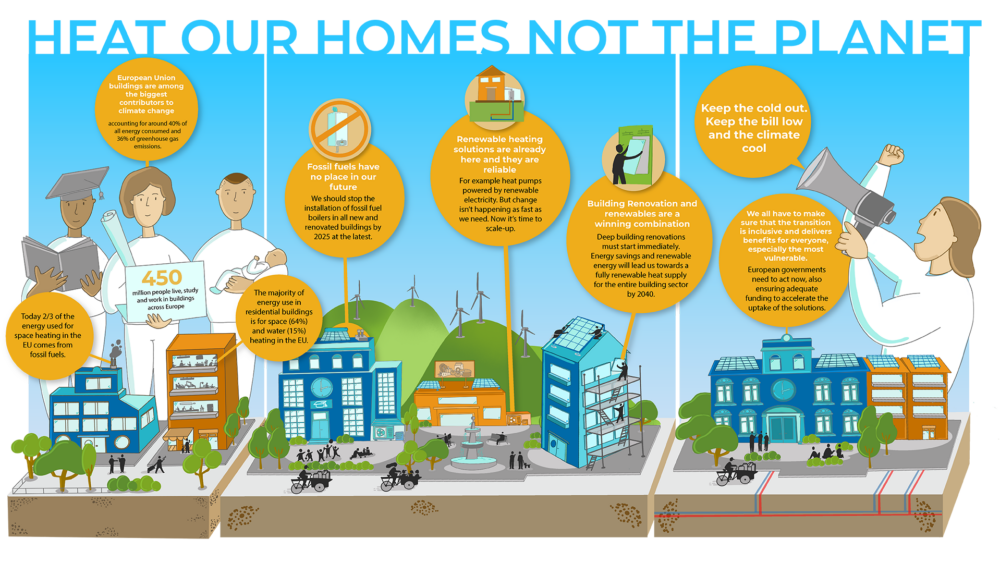There are more than 450 million of us living, studying and working in buildings across Europe that currently account for around 40% of all energy consumed and 36% of greenhouse gas emissions. The majority of our energy use in residential buildings is for space (64%) and water (15%) heating in the EU, and more than three quarters of heating in Europe is based on the use of fossil fuels and non-renewable electricity.
Current events in Ukraine have once more sharply demonstrated the importance of reducing our dangerous overdependence on fossil fuels and their imports, protecting consumers from price rises, achieving energy independence and, of course, tackling the climate crisis. CAN Europe and ECODES stressed this in a recent article in El País.
Different communications from the European Commission and Member States demonstrate that decision makers agree on the need for urgent action to change the current pattern, and to stop depending on Russian energy imports. However, it is important to get the recipe for this change right in order to increase energy security and achieve our climate goals to prevent a worsening climate crisis, while making sure that the people can fully take part in and benefit from the transition.

Deep building renovations must start immediately. One of the 8 recommendations that CAN Europe has put forward for an accelerated energy transition in Europe in response to Russia’s aggression in Ukraine is that all energy efficiency and savings potential of buildings must be fully tapped into by the EU and the Member States. Without securing deep renovations first, precious energy sources will literally fly out of the window. Households risk experiencing further difficulty in paying their energy bills, impacting severely on people with the lowest incomes and more socially vulnerable, unless they live in resilient buildings. Energy savings and renewable energy will lead us towards a fully renewable heat supply for the entire building sector by 2040.
Fossil fuels have no place in our future. We should stop the installation of fossil fuel boilers in all new and renovated buildings by 2025 at the latest. Replacing old heating systems in buildings with renewable energy heating solutions, such as heat pumps powered by renewable electricity, must speed up as they can significantly decrease dependence on fossil fuel imports. Member States should design dedicated support schemes to homeowners and tenants to ease the access to heating solutions, and implement them starting from the lowest income and less-resourced households. National-level processes to determine the priority households which are more exposed to energy price volatility should kick-off immediately.
The European Union and national governments cannot ignore the calls coming from within and outside Europe, but also from business and civil society.
Renewable heating solutions already exist, are reliable, versatile, promote energy self-sufficiency and reduce our dependence on fossil fuels. They also debunk the myth that fossil gas is needed as a transition fuel, and expose hydrogen in the residential sector as a false solution.
In a recent sit down with Tara Connolly, Senior Gas Campaigner at Global Witness, Jörg Mühlenhoff, Energy Transition Policy Coordinator at CAN Europe, asks about the opportunities for lower income households to be a part of a switch to renewable heating solutions for their households. Tara explains the possible routes and benefits for switching to more renewable methods for heating homes such as installing a heat pump.
European governments need to act now, also ensuring adequate funding to accelerate the uptake of the solutions. We all have to make sure that the transition is inclusive and delivers benefits for everyone, especially the most vulnerable. The European Union and national governments urgently need to take decisive action to help reduce greenhouse gas emissions, reduce our dependence on fossil fuels, reduce the energy bills of Europeans and alleviate the effects of energy poverty. The solutions exist, our climate targets are set, civil society is calling for it and the current geopolitical situation reinforces the need for urgent action.



